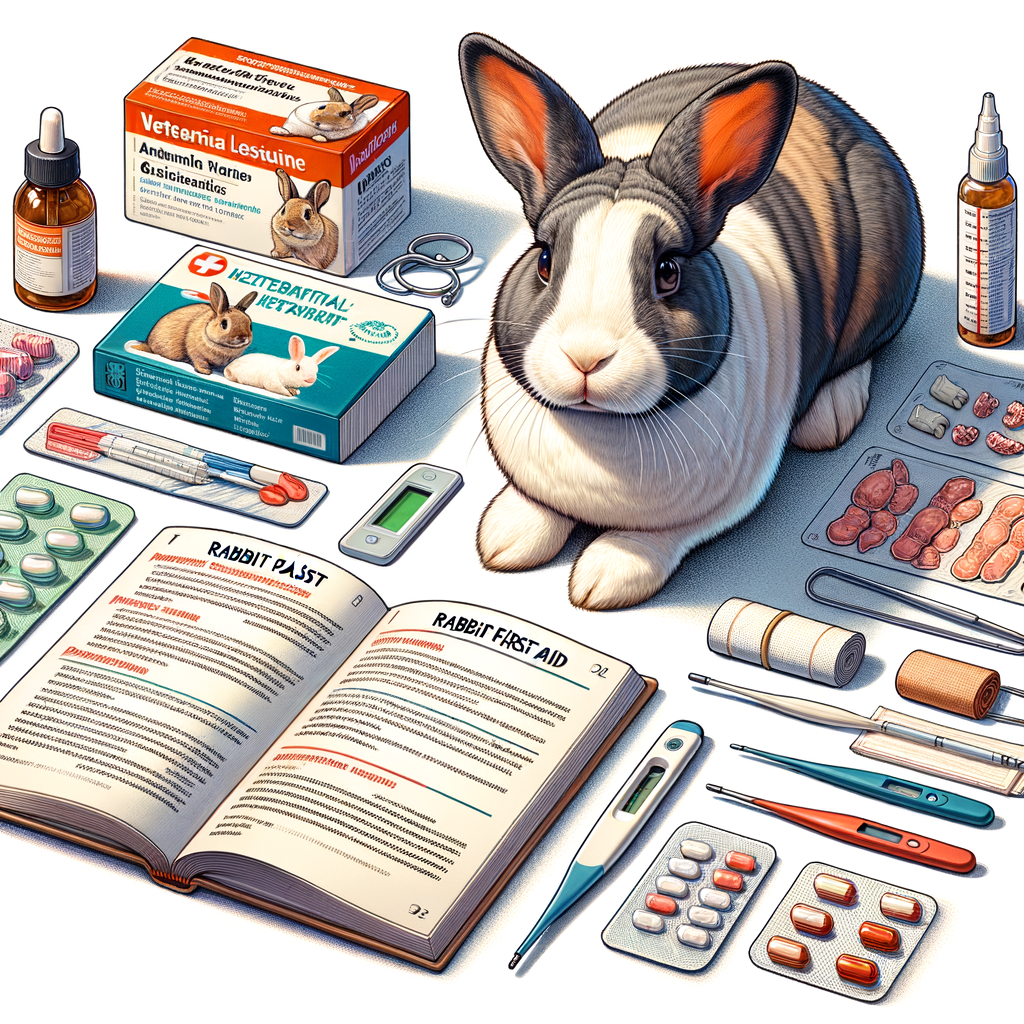
Introduction to Rabbit Health Issues
Just like humans, rabbits also need proper care to stay healthy. Understanding the importance of rabbit health and being aware of common health issues can help you ensure your bunny lives a long, happy life. Let’s delve into these topics.
- Understanding the Importance of Rabbit Health
Rabbits are delicate creatures with unique health needs. Their health is crucial because it affects their happiness, lifespan, and overall quality of life. A healthy rabbit is active, curious, and enjoys interacting with its environment and its human companions. On the other hand, a sick rabbit may become lethargic, lose appetite, or show other signs of discomfort.
As a responsible rabbit owner, it’s your duty to ensure your pet is healthy. This not only means providing them with a balanced diet and regular exercise, but also monitoring their behavior for any signs of illness. Early detection of health issues can make a significant difference in the outcome of the treatment.
- Common Rabbit Health Issues
Rabbits can suffer from a variety of health issues. Some of the most common ones include:
| Health Issue | Symptoms |
|---|---|
| Gastrointestinal (GI) stasis | Loss of appetite, small or no fecal pellets, lethargy |
| Dental problems | Difficulty eating, drooling, weight loss |
| Respiratory infections | Sneezing, nasal discharge, difficulty breathing |
| Parasites | Itching, skin irritation, hair loss |
These are just a few examples of the health issues that can affect rabbits. If you notice any unusual behavior in your pet, it’s important to consult a veterinarian immediately. Remember, early detection and treatment can save your bunny’s life.
First Aid for Rabbits: Why it’s Essential
Just like humans, rabbits can also experience health issues. When these occur, it’s crucial to know how to provide first aid. This can make a significant difference in your rabbit’s health and well-being. Let’s explore the importance of first aid for rabbits and how you can prepare for potential health problems.
- Importance of First Aid for Rabbits
Rabbits are delicate creatures. Their health can deteriorate rapidly if they are not given immediate attention when they fall ill. First aid is not a substitute for veterinary care, but it can be a lifesaver in emergency situations. It can help stabilize your rabbit until you can get them to a vet.
First aid can also help prevent minor health issues from escalating into major ones. For instance, a small wound, if left untreated, can lead to infection. But with proper first aid, you can clean the wound and prevent bacteria from spreading.
Moreover, knowing how to administer first aid can give you peace of mind. It can make you feel more confident and prepared to handle any health issues that your rabbit may encounter.
- Preparing for Rabbit Health Problems
Preparation is key when it comes to rabbit health. Here are some steps you can take:
- Learn about common rabbit health issues: Some common health problems in rabbits include overgrown teeth, hairballs, and ear mites. By learning about these, you can spot the signs early and take action.
- Get a rabbit first aid kit: A first aid kit equipped with essential items like gauze, antiseptic wipes, and a digital thermometer can be very helpful in emergencies.
- Find a rabbit-savvy vet: Not all vets are experienced with rabbits. It’s important to find one who is, so they can provide the best care for your rabbit.
- Regular check-ups: Regular veterinary check-ups can help detect health issues early on. This can lead to quicker treatment and better outcomes.
In conclusion, first aid for rabbits is essential. It can help manage health problems and even save your rabbit’s life in emergencies. By being prepared, you can ensure that your rabbit gets the care they need when they need it.
Rabbit Care: Preventive Measures
One of the most effective ways to ensure your rabbit’s health is by taking preventive measures. A key aspect of this is providing a healthy diet.
Healthy Diet
Just like humans, rabbits need a balanced diet to stay healthy. The right diet can help prevent many common health issues in rabbits.
- Importance of a Balanced Diet
A balanced diet is crucial for your rabbit’s overall health. It helps maintain a healthy weight, promotes good digestive health, and strengthens the immune system. A well-fed rabbit is more active, happier, and less likely to fall sick.
- Recommended Foods for Rabbits
Rabbits require a diet rich in hay, fresh vegetables, and a small amount of pellets. Hay should make up about 70% of their diet as it aids in digestion and dental health. Fresh vegetables provide necessary vitamins and minerals. Pellets should be given in moderation as they are high in calories.
| Food Type | Percentage of Diet |
|---|---|
| Hay | 70% |
| Fresh Vegetables | 20% |
| Pellets | 10% |
Remember, not all foods are safe for rabbits. Avoid feeding them foods high in sugar or starch. Always introduce new foods gradually to avoid upsetting their sensitive digestive systems.
Regular Exercise
Just like humans, rabbits also need regular exercise to stay healthy and happy. Let’s explore the benefits of regular exercise for rabbits and some safe exercises your bunny can do.
- Benefits of regular exercise for rabbits
- Improved Digestion: Exercise helps to stimulate your rabbit’s digestive system, preventing issues like gastrointestinal stasis.
- Mental Stimulation: Exercise provides mental stimulation, keeping your bunny happy and reducing the risk of boredom and related behaviors.
- Weight Control: Regular exercise helps to maintain a healthy weight, reducing the risk of obesity-related health issues.
- Stronger Muscles and Bones: Exercise helps to build stronger muscles and bones, reducing the risk of injury.
- Safe exercises for your bunny
- Hopping: Allow your bunny to hop around in a safe, enclosed space. This is a natural form of exercise for rabbits.
- Tunneling: Provide tunnels for your bunny to run through. This can be as simple as a cardboard box with two holes cut out.
- Jumping: Set up small obstacles for your bunny to jump over. Make sure they’re low enough to prevent injury.
- Playing with Toys: Provide toys for your bunny to play with. This can help to stimulate both physical activity and mental engagement.
Regular exercise is crucial for your rabbit’s overall health and well-being. Here are some key benefits:
While exercise is important, it’s equally crucial to ensure that the exercises your bunny does are safe. Here are some safe exercises for your bunny:
In conclusion, regular exercise is a key part of maintaining your rabbit’s health. It provides numerous benefits and can be achieved through safe, simple activities. Remember, a happy bunny is a healthy bunny!
Building Your Bunny First Aid Kit
When it comes to taking care of your pet rabbit, being prepared for any health issues or emergencies is crucial. A well-stocked bunny first aid kit can be a lifesaver in such situations. Let’s explore the essential items you should have in your kit and how to use them effectively.
- Essential items for rabbit first aid
Here are some must-have items for your bunny first aid kit:
| Item | Purpose |
|---|---|
| Styptic Powder | Stops bleeding from minor cuts or nail trims gone wrong. |
| Saline Solution | Cleans out wounds or rinses eyes. |
| Thermometer | Checks your rabbit’s body temperature. |
| Small Towel | Wraps your rabbit during treatment or keeps them warm. |
| Disposable Gloves | Keeps both you and your rabbit safe during treatment. |
- How to use the items in your bunny first aid kit
Knowing how to use the items in your first aid kit is just as important as having them. Here are some tips:
- Styptic Powder: Apply a small amount to the bleeding area. It helps to clot the blood and stop the bleeding.
- Saline Solution: Use a clean cloth or cotton ball soaked in saline solution to gently clean wounds. For eyes, gently pour the solution from the inner corner outward.
- Thermometer: Insert the thermometer into your rabbit’s ear to check their temperature. Normal rabbit temperature ranges from 101.3 to 104 degrees Fahrenheit.
- Small Towel: Use the towel to wrap your rabbit securely but gently during treatment. This can help to calm them and prevent them from hurting themselves or you.
- Disposable Gloves: Always wear gloves when treating your rabbit to prevent the spread of germs.
Remember, while a first aid kit is an essential part of rabbit care, it’s not a substitute for professional veterinary care. Always consult with your vet if your rabbit is sick or injured.
Rabbit Health Care: Regular Check-ups
Just like humans, rabbits also need regular health check-ups. These check-ups ensure that your bunny stays in the best possible health. Let’s delve into the importance of regular vet visits and what to expect during a rabbit health check-up.
- Importance of regular vet visits
- What to expect during a rabbit health check-up
Regular vet visits are crucial for your rabbit’s health. These visits can help catch any potential health issues early, making them easier to treat. According to the House Rabbit Society, rabbits should have a check-up at least once a year. However, older rabbits or those with health issues may need to visit more frequently.
During these visits, the vet will perform a thorough physical examination of your rabbit. They will check for any signs of illness or discomfort. Regular vet visits also provide an opportunity for your rabbit to get necessary vaccinations and treatments for parasites. Moreover, these visits allow you to ask any questions or voice any concerns you may have about your rabbit’s health.
During a rabbit health check-up, the vet will typically perform a series of examinations. They will check your rabbit’s weight, as sudden weight loss or gain can indicate health issues. The vet will also examine your rabbit’s teeth, as dental problems are common in rabbits. They will check your rabbit’s ears for any signs of infection or mites, and they will listen to your rabbit’s heart and lungs.
The vet will also check your rabbit’s eyes for any signs of infection or injury. They will examine your rabbit’s skin and fur for any signs of parasites or skin conditions. Finally, they will check your rabbit’s rear end for any signs of digestive issues or urinary problems.
It’s important to remember that every rabbit is unique, and the specific procedures during a check-up may vary depending on your rabbit’s age, health, and lifestyle. Always feel free to ask your vet any questions you may have during the check-up.
In conclusion, regular check-ups are an essential part of rabbit health care. They help ensure that your rabbit stays healthy and happy. So, make sure to schedule regular vet visits for your bunny!
Emergency Kit for Rabbits: Being Prepared
As a rabbit owner, it’s crucial to be prepared for emergencies. Having an emergency kit for your rabbit can make a significant difference in times of need. This kit should contain essential items that can help you manage your rabbit’s health issues until you can get professional help. Let’s discuss the essential items for an emergency kit and how to use them effectively.
- Essential items for an emergency kit for rabbits
Here are some of the essential items you should include in your rabbit’s emergency kit:
| Item | Description |
|---|---|
| Styptic Powder | This is used to stop bleeding from minor cuts or nail trims gone wrong. |
| Saline Solution | It’s used to clean wounds or flush out a rabbit’s eyes if they get something in them. |
| Thermometer | It’s essential to monitor your rabbit’s temperature as a sudden change can indicate illness. |
| Critical Care Food | This is a special diet for rabbits who are not eating their regular food due to illness or stress. |
| Water Bottle | Hydration is crucial for a sick rabbit. Always have a water bottle in your kit. |
- How to use the items in your emergency kit
Knowing how to use the items in your emergency kit is just as important as having them. Here’s a quick guide:
- Styptic Powder: Apply it directly to the wound to help stop the bleeding. Be sure to apply gently to avoid causing more pain.
- Saline Solution: Use a clean cloth or cotton ball soaked in saline solution to clean the wound. For the eyes, gently flush the eye with the solution.
- Thermometer: Always use a digital thermometer for accuracy. The normal body temperature for a rabbit is between 101.3 and 104 degrees Fahrenheit.
- Critical Care Food: Mix with water and feed to your rabbit using a syringe. This should only be used if your rabbit is refusing to eat their regular food.
- Water Bottle: Keep your rabbit hydrated by providing fresh water at all times. If your rabbit is refusing to drink, you may need to use a syringe to hydrate them.
Remember, an emergency kit is a temporary solution. Always seek professional help if your rabbit is unwell. Your rabbit’s health and wellbeing should always be your top priority.
Rabbit First Aid Guide: Handling Common Health Issues
One of the common health issues that rabbits face is overgrown teeth. Let’s delve into how to identify and handle this issue.
Overgrown Teeth
Rabbits have a unique dental structure. Unlike humans, their teeth continue to grow throughout their lives. This can sometimes lead to a problem known as overgrown teeth. It’s important for rabbit owners to know how to identify and handle this issue.
- How to identify and handle overgrown teeth
Identifying overgrown teeth in rabbits can be a bit tricky. The most common signs include:
- Difficulty eating or loss of appetite
- Drooling or wetness around the mouth
- Weight loss
- Changes in fecal pellets (smaller, fewer)
If you notice any of these signs, it’s likely that your rabbit may be suffering from overgrown teeth. Handling this issue requires a professional vet’s intervention. Regular dental check-ups can help prevent this problem. In severe cases, the vet may need to trim the teeth under anesthesia.
Remember, it’s crucial to provide your rabbit with a diet that promotes natural wear of teeth. This includes a high-fiber diet with plenty of hay. Toys made of wood can also help keep their teeth in check.
Understanding and addressing common health issues like overgrown teeth is an essential part of rabbit first aid. With the right knowledge and care, you can ensure your furry friend stays healthy and happy.
Gastrointestinal Stasis
Gastrointestinal stasis, often called “GI stasis,” is a serious condition that can affect rabbits. It’s when the digestive system slows down or stops completely. This can be very dangerous for rabbits, as they need to eat and digest food regularly to stay healthy. Let’s learn how to identify and manage this condition.
- Identifying Gastrointestinal Stasis
- Loss of appetite
- Small, hard droppings or no droppings at all
- A hunched posture or signs of discomfort
- Lethargy or decreased activity
- Managing Gastrointestinal Stasis
- Medical Treatment: Your vet may prescribe medications to help get your rabbit’s digestive system moving again. This can include pain relievers, motility drugs, and sometimes antibiotics.
- Diet: A diet high in fiber is crucial for rabbits with GI stasis. This can include hay, fresh vegetables, and certain types of rabbit pellets.
- Hydration: Keeping your rabbit hydrated is also very important. Make sure they always have access to fresh water.
- Exercise: Regular exercise can help keep your rabbit’s digestive system healthy. Encourage your rabbit to move around and play each day.
Identifying GI stasis early is crucial for your rabbit’s health. Some signs to look out for include:
If you notice any of these signs, it’s important to consult with a vet immediately.
Managing GI stasis involves a combination of medical treatment and changes to your rabbit’s diet and lifestyle. Here are some steps you can take:
Remember, GI stasis is a serious condition. If you suspect your rabbit has it, seek veterinary care immediately.
Conclusion: Ensuring Your Rabbit’s Health
As we draw this comprehensive guide to a close, it’s important to remember that the health of your rabbit is paramount. With the right knowledge and tools, you can ensure your furry friend lives a long, happy, and healthy life.
- Recap of rabbit health care and first aid
- Final thoughts on maintaining your rabbit’s health
Throughout this guide, we’ve covered a range of topics crucial to your rabbit’s health. We’ve delved into common health issues, the importance of first aid, and how to build an effective bunny first aid kit. We’ve also discussed the significance of regular check-ups and how to handle common health issues. Remember, prevention is always better than cure, and a well-prepared rabbit owner is the best defense against health problems.
As a rabbit owner, your role is to provide a safe, nurturing environment for your pet. This involves regular vet visits, a balanced diet, and plenty of exercise. It also means being prepared for emergencies with a well-stocked first aid kit. By following the advice in this guide, you’re taking a proactive approach to your rabbit’s health, which is the best way to ensure a long, happy life for your pet.
In conclusion, taking care of a rabbit is a rewarding experience that comes with its own set of challenges. But with the right knowledge and preparation, you can overcome these challenges and provide the best care possible for your pet. Remember, a healthy rabbit is a happy rabbit, and a happy rabbit makes for a happy owner.




